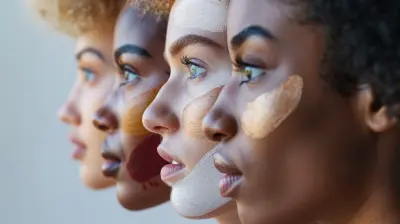The Hidden Pressure of ‘Fitspiration’ and Its Effect on Body Image
29 March 2025
Have you ever scrolled through social media, only to be bombarded with endless images of perfectly sculpted bodies, glistening abs, and flawless workout routines? It's like everyone's suddenly become a fitness model, effortlessly lifting weights or doing yoga poses that seem straight out of a Cirque du Soleil audition. This trend, often referred to as "fitspiration" (a blend of ‘fitness’ and ‘inspiration’), might seem motivational on the surface. But, beneath this shiny exterior lies a darker side that can mess with how we see ourselves: the hidden pressure of ‘fitspiration’ and its effect on body image.

What Exactly Is ‘Fitspiration’?
Let’s break it down. ‘Fitspiration’ is a term that’s exploded in the world of social media. It's a category of content that combines fitness with inspirational quotes, images, and videos, encouraging people to adopt a healthier lifestyle. Sounds great, right? After all, we could all use a little motivation to hit the gym or eat cleaner.However, as with most things plastered all over the internet, fitspiration has become a double-edged sword. Once intended to inspire, it often ends up creating unrealistic expectations about fitness and body image. It’s like looking at a perfectly filtered picture of a sunset and then feeling disappointed when your actual sky just looks... normal. The same thing is happening with our bodies.
The Rise of Social Media and Body Ideals
Social media platforms like Instagram, TikTok, and Pinterest have become the modern-day billboards for fitspiration. With influencers and fitness enthusiasts posting daily photos and workout routines, it’s easy to get caught up in the illusion that we should all look a certain way. The algorithm loves “perfection.” The more flawless your body looks, the more likes and followers you get. It’s like a never-ending cycle of validation, and guess what? The audience gets hooked.But the truth is, these images are typically highly curated. Filters, lighting, angles, and even photo-editing apps like FaceTune are often used to enhance these posts. It’s not real life. Yet, many of us unknowingly start comparing our own bodies to these idealized versions, leading to a distorted perception of what we “should” look like.

How ‘Fitspiration’ Distorts Body Image
Unrealistic Expectations
The most obvious issue with fitspiration is that it sets the bar ridiculously high. Let’s be real—it would take a lot of time, effort, and probably a professional trainer to look like many of the influencers preaching fitness online. And don’t forget, most of them have sponsorship deals, meaning they’re literally getting paid to look that good.When we constantly see these "perfect" bodies, it’s easy to feel like we’re falling short. We start asking ourselves, "Why don’t I look like that?" or "Am I not working hard enough?" But here’s the kicker: many of the bodies showcased are simply unattainable for the average person. Genetics play a huge role in how we store fat, build muscle, and even in how we look after a sweaty workout. Comparing yourself to these curated images is like comparing apples to oranges.
The Cult of "Before and After" Photos
Another common fitspiration tactic is the infamous “before and after” photo. You know the drill—someone posts a picture of themselves before they started their fitness journey, looking untoned and maybe a little downcast. Next to it is the “after” picture, where they’re suddenly ripped, glowing, and radiating confidence like they just stepped off a movie set.While these photos can sometimes be genuine, they often oversimplify the complex nature of body transformation. The message they send is that happiness and self-worth are tied to achieving a specific body type. And let’s not forget, many of these transformations happen under very controlled circumstances. Lighting, poses, and even the time of day can drastically alter how someone looks in a photo. It’s like magic, but not the good kind.
The Pressure to Always "Do Better"
Fitspiration isn’t just about how you look; it’s also about what you're doing. Whether it's a 5 AM workout, meal prepping for the week, or hitting new personal records in the gym, there's this unspoken pressure to constantly push yourself harder. It's as if you can never relax because, well, there's always more you could be doing to "improve."But here’s the thing: life isn’t a constant uphill battle. Sometimes, you’re going to miss workouts. Sometimes, you’re going to eat that donut. And guess what? That’s okay. Constantly striving for improvement, while admirable, can also lead to burnout and a sense of never being good enough.

The Psychological Impact of ‘Fitspiration’
Body Dysmorphia and Negative Self-Image
One of the most damaging effects of fitspiration is how it can contribute to body dysmorphia—a condition where a person constantly obsesses over perceived flaws in their appearance. When you're constantly bombarded with images of "perfect" bodies, it's easy to become hyper-aware of your own body’s imperfections. You might start picking apart your reflection in the mirror, focusing on areas you believe don't measure up.The problem is that this can create a vicious cycle. The more you focus on your flaws, the worse you feel about yourself, and the more desperate you become to "fix" things that may not even need fixing. It’s like chasing a mirage in the desert. No matter how much you run, the destination keeps moving farther away.
Anxiety and Depression
When the gap between how you look and how you think you should look grows too wide, it can lead to feelings of inadequacy, anxiety, and even depression. You might feel like you’re failing because you can’t achieve the same results as the influencers you follow. It’s as if the finish line keeps moving, and no matter how much you run, you can’t catch up.The constant comparison game can also erode your sense of self-worth. Instead of appreciating your body for what it can do, you start resenting it for not looking like someone else’s. This can make you feel trapped in your own skin, which, let's be honest, is a pretty miserable place to be.
Orthorexia and Over-Exercising
Fitspiration often promotes not just physical appearance, but also specific lifestyle choices—like strict diets or intense workout regimens. While there's nothing wrong with adopting healthier habits, it can become dangerous when taken to extremes. Orthorexia, an obsession with eating “clean” or “healthy” foods, is one disorder that can arise from this mentality.Similarly, over-exercising can occur when people feel compelled to constantly push their bodies to the limit. Instead of listening to their bodies and allowing time for rest, they believe they need to work out harder and more often to achieve the ever-elusive "ideal body."

How to Protect Yourself from the Pressure of ‘Fitspiration’
So, with all these potential pitfalls, how do we engage with fitspiration in a healthy way? It’s all about balance and maintaining a sense of reality.Curate Your Feed Wisely
First things first—take control of what you're consuming. If certain accounts make you feel bad about yourself, unfollow them. It’s your social media feed, and you have the power to shape it in a way that supports your mental well-being. Instead, follow accounts that promote body positivity, self-love, and realistic approaches to fitness and health.Focus on What Your Body Can Do, Not What It Looks Like
Instead of fixating on your appearance, shift your focus to what your body can do. Can you lift heavier weights than you could a month ago? Are you running faster or further? These are the types of goals that offer long-term satisfaction, not to mention they’re generally better for your mental health.Set Realistic Goals
If you’re embarking on a fitness journey, set goals that are attainable and based on your own body’s capabilities, not someone else’s. Remember that fitness is about more than just aesthetics; it's about strength, endurance, flexibility, and overall health.Practice Self-Compassion
It’s okay to have off days. It’s okay to not look like a fitness model. Be kind to yourself. Your body is doing its best to support you, and that’s something worth celebrating—regardless of how many abs you can see in the mirror.Conclusion: Finding a Healthy Balance
The pressure from fitspiration is real, and its impact on body image shouldn't be underestimated. While it can be motivating for some, it can also lead to unhealthy comparisons and a distorted sense of self-worth for others. The key is to engage with fitspiration in a way that enhances your life, rather than detracting from it.At the end of the day, your worth isn’t defined by how you look in gym clothes or whether you’ve got a six-pack. It’s defined by who you are, how you treat others, and how you treat yourself.
all images in this post were generated using AI tools
Category:
Body ImageAuthor:

Eliana Burton
Discussion
rate this article
6 comments
Velma Beck
This article astutely highlights how 'fitspiration' can perpetuate unrealistic body ideals, emphasizing the importance of promoting healthier, diverse representations of fitness and well-being.
April 7, 2025 at 3:48 PM

Eliana Burton
Thank you for your insightful comment! I'm glad the article resonated with you and highlights the need for diverse and realistic representations of fitness.
Jet Barnes
Fitspiration can undermine healthy body image.
April 6, 2025 at 2:49 AM

Eliana Burton
Thank you for your comment! You're absolutely right; fitspiration can often promote unrealistic standards and foster negative body image, highlighting the need for a more inclusive and balanced approach to health and fitness.
Ardent McQuaid
What a thought-provoking read! It's eye-opening to see how 'fitspiration' can shape our perceptions. Let's embrace a healthier approach to fitness and body image, celebrating all bodies and their unique journeys!
April 4, 2025 at 4:26 PM

Eliana Burton
Thank you for your insightful comment! I'm glad the article resonated with you and that you support a more inclusive approach to fitness and body image. Celebrating all bodies is essential for a healthier mindset!
Amos Cantu
Great article! It’s crucial to recognize the impact of ‘fitspiration’ on our body image. Your insights shed light on the hidden pressures many face, encouraging us to embrace diversity in body shapes and prioritize mental well-being. Thank you!
April 4, 2025 at 3:03 AM

Eliana Burton
Thank you for your thoughtful comment! I'm glad you found the article valuable and agree on the importance of embracing diversity and prioritizing mental well-being.
Harper Evans
Fitspiration often obscures true wellness, prioritizing unrealistic ideals over authentic health. It's vital to cultivate body positivity and self-acceptance, recognizing that well-being comes in diverse shapes and sizes.
April 3, 2025 at 3:49 AM

Eliana Burton
Thank you for your insightful comment! I completely agree that true wellness embraces diversity and prioritizes self-acceptance over unrealistic ideals. Promoting body positivity is essential in fostering authentic health.
Lennox McClellan
Thank you for shedding light on the hidden pressures of 'fitspiration.' It's crucial to recognize how these ideals can impact our body image and self-worth. Let's promote a more compassionate view of health that emphasizes self-acceptance and celebrates diverse bodies, fostering a supportive community.
April 1, 2025 at 2:23 PM

Eliana Burton
Thank you for your insightful comment! I completely agree—promoting self-acceptance and celebrating diverse bodies is essential for fostering a healthier, more compassionate view of fitness.
MORE POSTS

How Sensory Processing Disorders Affect Emotional Well-Being in Kids

How to Manage Emotional Overwhelm with Grounding Techniques

Body Image Across Cultures: How Different Societies View Beauty and Health

Healing After Heartbreak: Reclaiming Your Emotional Wellbeing

Addressing the Stigma Around Childhood Mental Health Disorders